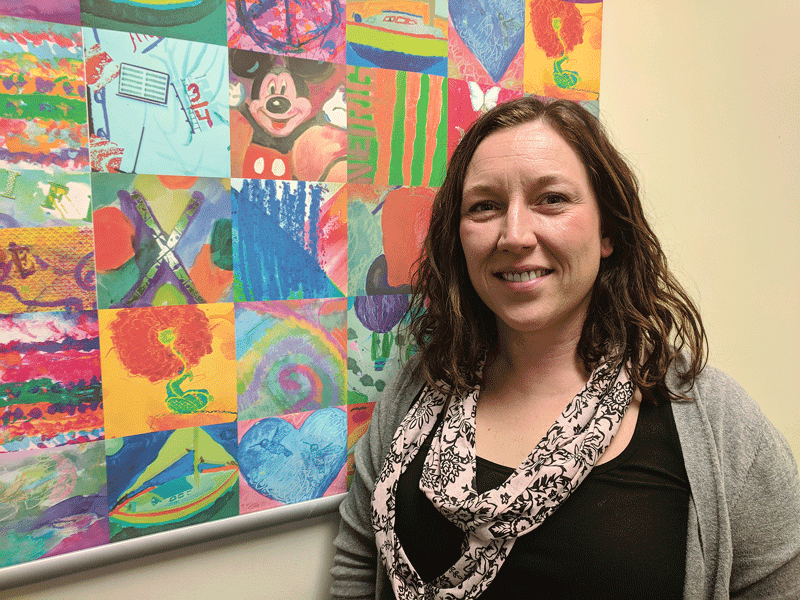Gándara Center Continues to Meet Critical Community Needs
The opioid crisis in Massachusetts, which has dominated headlines and health-policy debates over the past few years, is hardly a new problem, Lisa Brecher says.
“We call it the opioid epidemic, but in Hispanic communities, this has been an epidemic for much longer than the newspapers have been talking about it,” she noted, before explaining the many ways the Gándara Center has been grappling with addiction for decades.
“There’s the 42-bed home in Springfield dedicated to Spanish-speaking men with alcohol and drug dependency, where clients stay six months to a year to get their lives back on track. And a similar, 30-bed residential home for women in Holyoke. And additional recovery-support centers in Brockton and Hyannis, just to name a few.
Gándara works closely with state agencies — 90{06cf2b9696b159f874511d23dbc893eb1ac83014175ed30550cfff22781411e5} of its funding comes from state sources like the Department of Public Health, Department of Mental Health, and Department of Children & Families, with some federal grants sprinkled in — to meet public-health needs, and addiction has long been a key one.
“We talk about continuum of care,” said Brecher, Gándara’s director of Communications and Development. “We don’t have detox, but we have several step-down programs from detox. As important as detox is, if someone goes through detox and you place them right back into the same setting, you’re setting them up to fail if you’re not helping them maintain their recovery with transitional support services.”
The Gándara Center opened in 1977 as an outpatient mental-health clinic in the North End of Springfield, in response to a wave of Hispanic immigration into the region, many of the newcomers with trauma and substance-abuse issues, and limited access to services that could help them.
“You hear buzzwords like ‘culturally sensitive,’ but we’ve been doing that — under the radar, somewhat — for four decades,” Brecher said, noting that the center’s tagline, “dedicados a mejorar su salud,” translates to “dedicated to improving your health,” with ‘health’ encompassing a broad umbrella of meanings.
Gándara still operates that outpatient clinic and others like it, but also maintains youth and adult residential homes for individuals transitioning back to the community from incarceration and substance abuse; residential homes for adults with mental illness and developmental disabilities; the Springfield Family Resource Center, which helps clients navigate through the housing, education, and legal systems; a foster-care program; and a series of community education, prevention, and health programs, among other services.
“We try to do needs assessments; we look at communities and find out where the most vulnerable populations are, where are people being underserved, and we respond to that with a program,” Brecher said.
As an example, Gándara integrates primary care into its outpatient behavioral-health clinics. “We were seeing a lot of folks coming to us for mental health that were not going to a PCP, or children that needed wellness visits and didn’t even have a PCP. These were people suffering from major chronic condition, like diabetes and COPD, that weren’t being treated. We thought, they’re coming to us, we’ve got them, we’re the front door. Why not engage them?”
The peer-support home for women ages 18 to 24 recovering from substrance abuse is another example. “That’s a tough age to hit,” she said. “Folks later in life tend to be more ready to take the step to recovery. Adolescents get involved in recreational binge drinking, and by the time they realize it’s a big issue, sometimes it’s not as soon as we would like to reach them. We’ve been trying to reach that very vulnerable adolescent group.”
For this issue’s focus on behavioral health, HCN spoke with Brecher about an organization that offers those services plus many more, and why its programs remain relevant and critical four decades after the center’s humble beginnings.
Person to Person
In many ways, Brecher said, serving vulnerable populations is about meeting them where they are and narrowing the disparities that hinder people accessing the services they need.
“It’s not good enough to say John didn’t show up at his appointment today,” she noted. “Are there transportation issues? Is childcare an issue? Is he on a bus route, but the appointment is at 5 p.m. in January, and he doesn’t feel safe walking to the bus stop? We want to know what barriers people are facing, what issues that could be interfering with them getting the help they need, and addressing those as best we can.”
In addition, she explained, Gándara has long been at the forefront of hiring people with ‘lived experience’ to provide services, such as peer-support centers staffed by people in long-term recovery. A number of employees have grown up in poverty-stricken environments or been caregivers to children with severe emotional disturbances, to name other examples.
Gándara is also the largest provider of DCF group homes in Western Mass. “Some of these provide short-term respite while things are getting figured out, but a lot of these kids quite literally grow up in our homes,” she said. In addition, pre-independent-living programs, for people in the 18-to-24 age range, give clients a roof over their head and care management, but also life skills, with the goal of helping them transition into independent living.”
Gándara’s leaders understand the long-term — and often multi-generational — effects of issues like substance abuse and incarceration, such as when someone gets out of prison but finds it difficult to access employment or housing. That leads to economic and emotional crises in families that can impact their children’s school performance and chances of accessing higher education and good jobs — and the cycle continues.
It even affects Gándara’s ability to hire individuals who have dealt with the same issues clients do, as in the residential facilities.
“We want employees with lived experience, but we have to be selective about what we can and can’t accept on a background check,” Brecher said, adding that the state allows it to waive certain CORI issues because it recognizes the value of such peer support. In many cases, she added, employees, such as recovery coaches, are former clients, bringing Gándara’s services full circle.
In short, one size certainly does not fit all when it comes to crafting programs. A few years ago, a sizable Nepali refugee population surged into Springfield schools, many of whom were dealing with trauma and other issues, so Gándara hired some Nepali employees to support that population.
One of Brecher’s favorite examples of Gándara serving area communities is the Holyoke Youth Development Center, which houses programs like a media lab, computer literacy, and vocational training.
“We collaborate with a lot of other Holyoke organizations, like Girls Inc., Holyoke High School, and a couple others,” Brecher said. “Kids are learning to record music, edit music — some of them are actually the ones singing. We’re reaching a population of kids who might be brought in because the schools are making them, but once the session is over, they’re coming back.
“We’re getting kids to come into a safe space and hang out, learning their interests, letting them guide the way,” she went on. “We had kids coming in who were really interested in video games, and we started teaching them about coding. It was inspiring to watch them discover something they didn’t even know could be a career path.
Other participants learn résumé-building skills and create LinkedIn pages, she added. “When you want to go apply at Six Flags for a summer job, it’s really cool if you can give them a résumé with the application; it sets them apart. We also teach social-media responsibility, making kids aware that things follow you around, and your reputation online can have repercussions. That’s been a great program.”
Summer to Remember
Yet, the Gándara Center continues to look for new ways to make a difference. For instance, its directors continually heard from parents in the community who were stressed out about summer approaching, and having no child care and nowhere for their children to go, Brecher said, adding that kids at risk lose contact with the teachers and coaches that become their mentors during the school year. “We hear from police departments that summer in the inner city becomes a lot more dangerous.”
As Gándara’s 40th anniversary approached last year, Executive Director Henry East-Trou was adamant that he didn’t want to celebrate by spending money on a self-congratulatory gala. Instead, recognizing the financial need of many families who wanted to send their kids to summer camp but couldn’t afford it, Gándara reached out to the city of Springfield and Baystate Health, as well as a public fundraising campaign, to send 103 underserved Springfield youth to camp last summer, free of charge.
“There was so much wonderful feedback,” she said. “We heard from parents who said they didn’t know what they would do, but their kids were having the best time, exercising and doing things they never thought they’d have a chance to do. And we heard from people at the camp that these kids added a new, fresh layer to what’s going on there.”
Gándara recently started receiving calls asking if it would conduct a similar program in 2018, and with the continued support from Baystate and a campaign aiming to raise $20,000, it once again hopes to send 100 kids to summer camp.
With more than 800 employees statewide, Gándara is always looking to expand, Brecher said. “It’s always nice to grow from a business standpoint, but it really comes down to expanding in a way that is in direct response to the needs of the community.”
Meanwhile, the center continues to hone its focus in intriguing ways, such as its interest in establishing a focus on transgender youth, which is a special population with needs as distinct as the Hispanic population Gándara was originally created to serve.
“It’s not fair to have these youth who are transitioning to be in homes with a lot of other kids who are not, and with staff who don’t recognize and understand what they’re going through,” she told HCN. “We’re not serving them as best we can if we’re not placing them in a residence with other transgender youth and staff who may be transitioning or at least had training in gender studies. So we’re currently exploring what a facility dedicated to transgender youth in DCF care would look like, and that’s exciting.”
It’s just one more way the Gándara Center is reaching people where they need to be met.
“We’re trying to improve people’s lives, and we’re changing people’s lives,” she said. “This is literally life-changing work.”




Comments are closed.